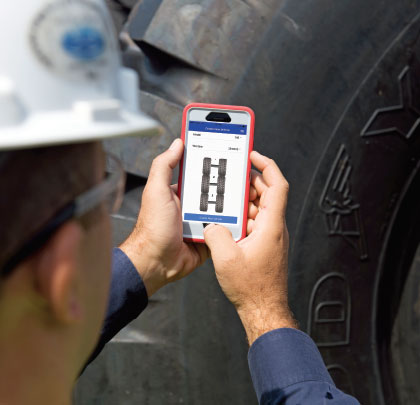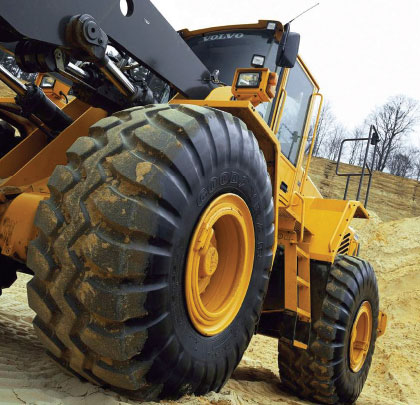Tires can represent a substantial investment for construction companies and like any investment, should be managed correctly to secure optimal returns, which can take the form of enhanced equipment performance, downtime prevention, and, ultimately, reduced operating costs.
Whether you are developing a new tire maintenance program for your fleet or want to improve upon your operation’s existing tire management program, we recommend that you ask these questions:
Are you working with a capable tire dealer who can support your tire program?
Working with a construction tire dealer who can track tire performance and provide customized, real-time reporting can enhance your tire management program. Does your tire dealer monitor the basics like tire changes, rotations, inflation, and tread wear? Does your dealer have access to a tire performance management system, such as Goodyear’s EMTrack program, for ongoing data storage, documentation, and sharing? Can your tire dealer help you understand your cost-per-hour, or in other words, how much money are you spending to run a tire? Is your dealer familiar with your equipment and your operation’s unique needs?
Do you understand how tire performance is tracked and how tire data can help you make better decisions about your valuable tire assets?
In addition to tracking traditional measurements such as inflation and tread wear, you can benefit from a tire performance management system that can document when tires are rotated to different wheel positions or are removed completely. We suggest always noting when a new tire is installed. Also, any shuffling or repositioning of a tire should be documented to help preserve the validity of your data. Careful tire performance tracking can also help you evaluate the effectiveness in your unique environment of the tire types you have selected. Pay attention to changes reflected in the tread surface of your tires, which can help confirm that you’ve selected the right tire for the job and even indicate how performance enhancements, if needed, can be achieved. When evaluating wear and other tire conditions, always work with a qualified construction tire dealer who can provide expert advice and make appropriate maintenance and/or product recommendations.
Are you acting on the data and information you’ve collected?
Information captured through an effective tire management program can help you make better decisions about the tires you are using. In addition, do you know that data can help you predict your future tire needs more accurately? By tracking performance and other indicators over time, you can enhance your ability to predict when tires need to be replaced. In today’s budget-conscious operating environment, efficient tire forecasting and ordering can help you to manage your tire inventory more effectively.
Is retreading for you?
In some cases, the service life of tire casings is extended through retreading. Is this a viable option for your operation? It depends on the tire and the condition of your casings after they’ve completed their first lifecycle. Goodyear believes a quality casing is the foundation of a quality retread. Following recommended tire maintenance practices, such as regular inflation checks, and if necessary, making inflation level adjustments can help preserve casing integrity. In fact, inflation maintenance is one of the most effective methods you can employ to help your casings remain retreadable. Both over-inflation and under-inflation should be avoided. Over-inflation can result in irregular and/or more rapid tread wear and even a harsher ride. Under-inflation can contribute to irregular/uneven wear, and increased potential for damage caused by rocks and other objects. Under-inflation also can hurt a machine’s fuel economy because under-inflated tires force engines to work harder. So, keep your tires properly inflated, and consider adding retreading to help reduce your tire costs.
CONCLUSION
Understanding the importance of tire management and working with a qualified tire dealer to develop and/or enhance your own tire management program can help your tires perform to their potential, which benefits your bottom line.
About the Author:
OTR tire veteran Eric Matson is the global field engineering manager for The Goodyear Tire & Rubber Company’s OTR tire business. For more information, visit www.goodyearotr.com.
_________________________________________________________________________
Modern Contractor Solutions, June 2018
Did you enjoy this article?
Subscribe to the FREE Digital Edition of Modern Contractor Solutions magazine.




